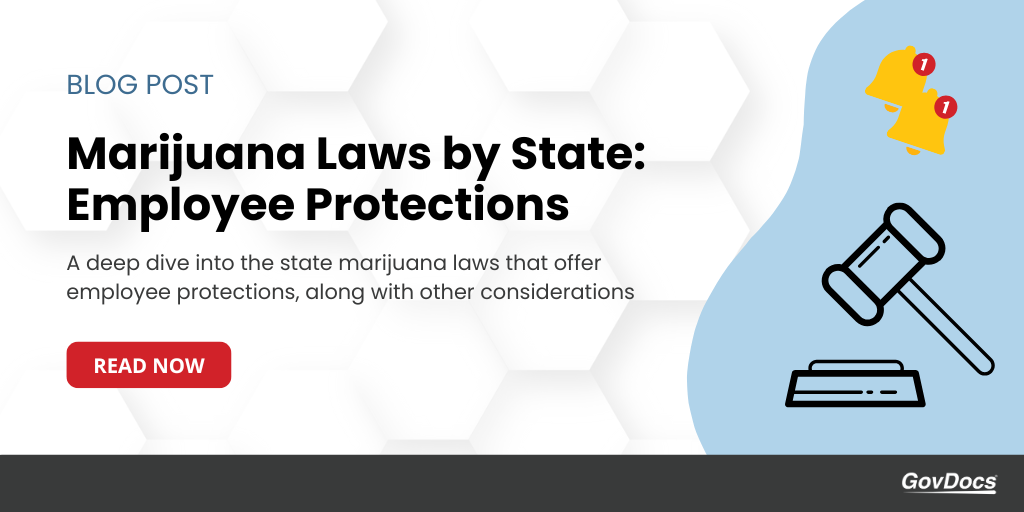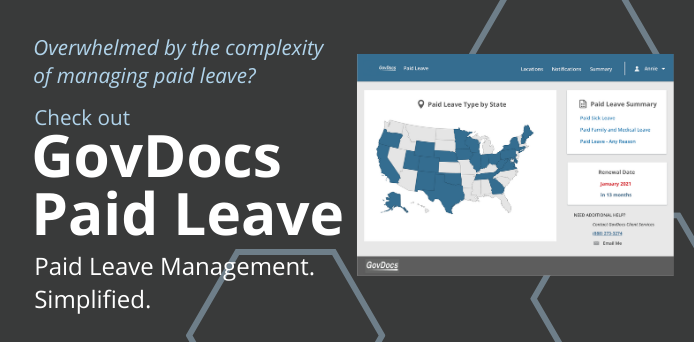EMPLOYMENT LAW NEWS
Marijuana Laws by State: Employee Protections
By Kris Janisch
Published Aug. 2, 2023

The number of state marijuana laws that provide employee protections continues to grow.
With recreational marijuana becoming more common, employers need to know the marijuana laws by state.
But more important are the states that have laws providing employee (and applicant) protections.
Employers must increasingly grapple with the tide of new marijuana laws across the U.S., where 23 states, plus the nation’s capital, have passed such legislation.
Here, Employment Law News provides a comprehensive rundown of these laws and how they impact employers.
As always, there are exceptions for certain types of jobs, generally safety-sensitive positions. Also, employers with federal contracts are often exempt from laws protecting employees for legal, off-duty use. (There has been a federal bill introduced that would open federal government jobs for marijuana users.)
Lastly, it bears noting that marijuana remains illegal at the federal level, in the same class as drugs such as heroin and LSD. Employers can also enforce a drug-free workplace, regardless of any employment law protections for marijuana use.
Employment Law Compliance. Simplified.
Recreational Marijuana Laws by State: Employee Protections
Below is information on states with employment law protections for off-duty marijuana use that apply in most situations.
Still, employers should always check the jurisdictions where they have locations to ensure compliance with the latest laws and guidance.
Webinar Recording: In the Weeds – Marijuana and Employment Law Compliance
California
Starting with California, the state passed a new marijuana law that goes into effect Jan. 1, 2024.
It prohibits employers from discriminating against employees for legal off-duty marijuana use (medicinal or recreational). The law also bars employers from terminating or disciplining employees for a drug test that comes back positive for THC.
Workers can be disciplined or terminated for being high on the job, however.
Connecticut
In Connecticut, employers cannot refuse to employ an applicant based solely on positive test result for marijuana.
Also, employers cannot discharge or take adverse action against an employee due to legal off-duty marijuana use — unless failure to do so would cause employer to violate federal contract or lose federal funding.
Illinois
Illinois has expansive employment laws regarding recreational marijuana.
To begin, the state’s Right to Privacy in the Workplace Act:
- Prohibits employers from refusing to hire, terminate or discipline individuals who use lawful products during off-duty time
- Considers “lawful” products those that are legal under state law — including marijuana
Meanwhile, the Illinois Cannabis Act provides more rights for employers. Under the law, employers can:
- Prohibit employees from being under the influence at work
- Conduct reasonable drug and alcohol testing, and reasonable and nondiscriminatory random drug testing
- Discipline employees for violating policy
Lastly, employers must have good-faith belief that an employee is showing specific, articulable symptoms that reduce their performance. However, employees disciplined for being under the influence or impaired by marijuana must be provided a reasonable opportunity to contest the basis of the determination.
Legalized Marijuana in Illinois: 5 Things Employers Need to Know
Montana
Montana’s nondiscrimination protections regarding recreational marijuana say employers cannot take adverse action against an employee for off-duty use unless:
- It affects the employee’s ability to perform job duties or safety of other employees
- It conflicts with an occupational qualification related to the individual’s employment
- The employee is working under a professional service contract authorizing employer to limit use of marijuana
Also, the protections to not apply to nonprofit employers if one of their primary purposes or objectives is to discourage the use of marijuana by the public.
Nevada
Nevada is an interesting case regarding recreational marijuana and employment protections.
Even though lawmakers have legalized marijuana, their state law protecting employees from off-duty legal conduct does not include the use of marijuana, because it remains illegal at the federal level.
However, employers cannot refuse to hire applicant due to positive marijuana test, though there are exclusions for:
- Firefighters
- EMTs
- Positions requiring operation of motor vehicle with federal or state law required drug testing
- Positions that could adversely affect safety of others as determined by employer
- If an employment contract or CBA or federal law provides otherwise
- Positions that are federally funded
New Jersey
New Jersey officials issued guidance regarding recreational marijuana in September 2022, providing employment protections for off-duty use:
- Employers may not refuse to hire an applicant due to positive marijuana test
- Employers are prohibited from discharging an employee based on positive marijuana test, unless they can demonstrate the employee was impaired at work
New York State
New York State’s law says employers cannot refuse to hire, fire or discriminate against applicants or employees for off-duty legal use of marijuana.
However, employers may still take adverse action in certain situations:
- Required by state or federal law
- Employee is impaired on the job
- Failing to do so would result in loss of federal contract or federal funding
Guidance from the New York Department of Labor also states that employers cannot test for recreational marijuana use unless one of the above situations is involved or as a result of another applicable law.
Rhode Island
Like other states on this list, in Rhode Island employers cannot refuse to hire, fire or discriminate against applicants or employees for off-duty use of marijuana.
Again, though, there are exceptions. Employers may still take adverse action if:
- Use is prohibited by a collective-bargaining agreement
- The employer is federal contactor
- Failing to do so would result in loss of a federal contract, licensing or federal funding
- The employee works in a hazardous, dangerous job or one essential to public welfare and safety
Virginia
Virginia’s law is somewhat different.
Employers are prohibited from requiring applicants to disclose information regarding an arrest, criminal charge or conviction for simple marijuana possession during the hiring process — including disclosures on any application for hire.
Washington
Washington’s law regarding recreational marijuana goes into effect Jan. 1, 2024.
Under the statute, employers:
- Are prohibited from discrimination in hiring due to an applicant’s lawful off-duty use of marijuana
- Will not be able to refuse to hire based on a drug test that is positive for non-psychoactive cannabis metabolites
As with other states, there are exceptions for federal contracts, employers receiving federal funding or licensing and safety-sensitive positions.
Washington, D.C.
Grouping Washington, D.C., with the list of states, employers there cannot refuse to hire or take adverse action against an employee for:
- Using recreational marijuana
- Participating in a medical marijuana program
- Failing to pass a drug test for marijuana
There are exceptions, however.
Marijuana Employee Protections – Cities
There are some local ordinances regarding protections for recreational marijuana use.
San Francisco
San Francisco employers are barred from conducting random, companywide blood, urine or encephalographic testing of employees as a condition of continued employment.
However, suspicion-based testing is allowed if:
- There is reasonable suspicion the employee is impaired on the job
- The employee is in a position where impairment is a clear and present danger to the safety of employees or someone else
- The employer provides the employee opportunity to have the sample tested and rebut or explain results
Also, employers can only test for chemical substances likely to affect the employee’s ability to safely perform the employee’s job.
New York City and Philadelphia
In two major East Coast cities, the laws regarding recreational marijuana are virtually identical.
Employers are prohibited from testing job applicants for marijuana as a condition of employment, though there are exceptions for:
- Law enforcement
- Jobs requiring commercial driver’s licenses
- Positions dealing with children, medical patients or vulnerable people
- Safety-sensitive positions
- Federal contractors
- Jobs that require federal drug testing
Keep Scrolling Past the Map and Chart for Additional Information
Legalized Recreational Marijuana by State
In addition to the laws on the books in the jurisdictions above, several other states have legalized recreational marijuana. The full list:
- Alaska
- Arizona
- California
- Colorado
- Connecticut
- Delaware
- District of Columbia
- Illinois
- Maine
- Maryland
- Massachusetts
- Michigan
- Minnesota
- Missouri
- Montana
- Nevada
- New Jersey
- New Mexico
- New York
- Oregon
- Rhode Island
- Vermont
- Virginia
- Washington
Employers with locations in these states should monitor any potential new employment laws or additional guidance.
Plus, several jurisdictions have taken up new recreational marijuana laws of late, including ballot measures. For companies that operate across the U.S., keeping up with these statutes will continue to be a challenge.
Other State Marijuana Laws
A couple of final notes on marijuana laws by state.
Legalized Medical Marijuana
- Alabama
- Alaska
- Arizona
- Arkansas
- California
- Colorado
- Connecticut
- Delaware
- Florida
- Hawaii
- Illinois
- Kentucky
- Louisiana
- Maine
- Maryland
- Massachusetts
- Michigan
- Minnesota
- Mississippi
- Missouri
- Montana
- Nevada
- New Hampshire
- New Jersey
- New Mexico
- New York
- North Dakota
- Ohio
- Oklahoma
- Oregon
- Pennsylvania
- Rhode Island
- South Dakota
- Utah
- Vermont
- Virginia
- Washington
- West Virginia
CBD Only
- Georgia
- Indiana
- Iowa
- Tennessee
- Texas
- Wisconsin
States with Total Marijuana Bans
- Idaho
- Wyoming
- Kansas
- South Carolina
Guide: Recreational Marijuana – What Employers Need to Know
Conclusion – Marijuana Laws by State: Employee Protections
The number of state marijuana laws that provide employee protections continues to grow.
Employers should be aware of the nuanced laws regarding hiring and disciplining employees.
This Employment Law News blog is intended for market awareness only, it is not to be used for legal advice or counsel.
Keep Informed
with GovDocs Employment Law News
Who is GovDocs?
GovDocs is a leading provider of employment law compliance solutions, empowering HR professionals to navigate complex, location-specific labor law postings, minimum wage requirements, and paid leave laws. GovDocs combines innovative technology with dedicated human-touch support to deliver worry-free compliance. Customers benefit from access to a centralized system, trusted resources, and expert employment law support they need, all in one place, to simplify compliance and protect their organization from risk. Trusted by over 35% of Fortune 500 companies, GovDocs focuses on comprehensive coverage of Federal, State, City, and County laws making employment law management seamless for organizations of all sizes. Join the evolution of employment law compliance here!
The GovDocs Poster Store simplifies posting compliance for employers with less than 30 locations across all industries, offering a variety of posting products to meet your labor law compliance needs.





